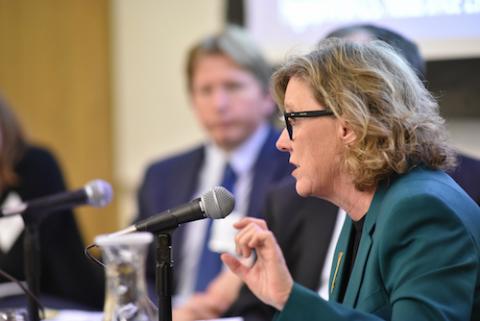Carlson Q&A: Why Biden’s Election Raises Optimism on Climate Policy

After the Trump administration eviscerated federal climate rules and rolled back more than 100 regulations that protected the environment, President-elect Joe Biden’s administration has significant work ahead to rebuild the nation’s climate policies, says UCLA School of Law Professor Ann Carlson. A leading scholar of climate change and air pollution law and policy, Carlson is the Shirley Shapiro Professor of Environmental Law and faculty co-director of the Emmett Institute on Climate Change and the Environment.
In this Q&A, she discusses why – even with a narrowly divided Congress and conservative Supreme Court – there’s still plenty of reason for optimism.
What makes you feel optimistic on climate policy?
The election of Joe Biden and Kamala Harris completely changes the landscape for climate policy. Climate change is the greatest environmental and existential threat we’ve faced as a country and the incoming administration has already signaled that it will make climate change one of its central areas of focus. Biden has announced that the U.S. will rejoin the Paris Agreement on climate change on the first day of his administration. He has made clear that he will immediately implement new climate policies, and he has included on his transition team climate experts for virtually every federal agency.
One big obstacle to climate progress will be Congress. Even if the Democrats win both Senate seats in Georgia, their majority would be quite narrow, and conservative Democrats could make it difficult to legislate on a Green New Deal or the Biden campaign’s ambitious climate platform.
Still, there are a lot of options available to Biden that may seem incremental but together would be quite powerful. I call it the don’t-put-all-your-eggs-in-one-basket approach. Even if the Biden administration can’t do everything that it should do, there’s a lot that can be done with a multipronged strategy, because many agencies have power over decisions that affect emissions.
What are some examples of how federal agencies can make a difference?
The State Department can reengage on international diplomacy to build global support for climate action. The Department of Energy sets efficiency standards for appliances like refrigerators and manages a large research and development budget that can focus on technological advances to decarbonize the economy. The Federal Energy Regulatory Commission has powerful authority over the electric grid and can use that authority to speed the transition to a clean and green grid. The Agriculture Department can work with farmers to improve farming practices in ways that sequester carbon. The Department of Defense is a huge consumer of renewable technologies. And the Environmental Protection Agency has significant power to cut greenhouse gases from virtually every major source in the country, even with a conservative Supreme Court in place.
How much of a barrier will the Supreme Court’s conservative majority be?
This could be the most anti-environmental court in history. The conservative majority presents risks for existing laws like the Clean Air Act, which the Supreme Court ruled in Massachusetts v. EPA covers greenhouse gases and which the Obama Administration used to cut climate pollution. While I doubt the Court will overturn Massachusetts v. EPA, it could strike down EPA regulations that are novel or far-reaching. That said, fear should not get in the way of ambition for climate advocates and policymakers. By the time a case reaches the Supreme Court, it could be four years from now. By then, circumstances may have changed that could improve the prospects for climate laws, including changes in the composition of the court.
If Congress is split, is it likely to approve any significant climate change legislation?
With Congress likely to be narrowly divided, several important policies could still garner bipartisan support and advance climate action. There are many actions to take on climate change, because it’s a problem that affects every part of our economy.
The biggest driver for renewable energy in the United States has been renewable tax credits, which Republicans like. Legislators can incentivize a lot of behavior with tax credits. Congress could also fund research and development. Under President Trump, EPA and Energy Department budgets have actually increased, including for clean energy research. A full clean-infrastructure package might be stymied by Mitch McConnell, the current Senate majority leader, but an infrastructure bill could still help fund green tech and programs that reduce emissions, including investments in electric vehicle infrastructure. Congress might even be willing to regulate hydrofluorocarbons, or HFCs, the highly potent greenhouse gases that some Republicans have signaled they might be willing to cut.
The bottom line is that there is no single fix to get climate change under control. Instead, we need an all-hands-on-deck approach, one that President-elect Biden can begin to implement the day he takes office.